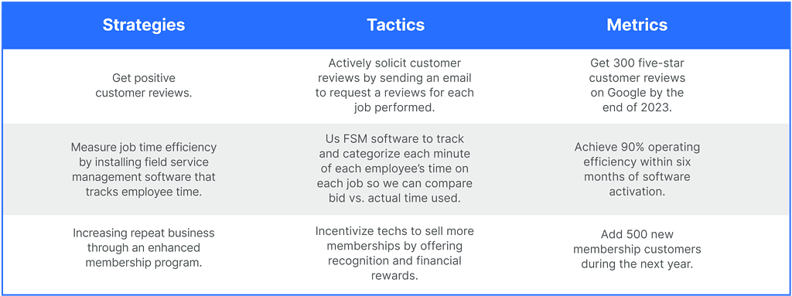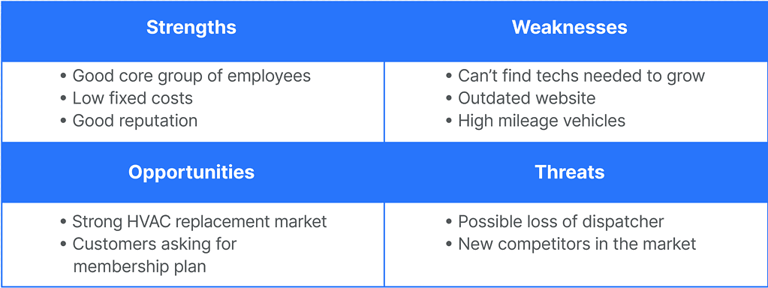Small Business Marketing for Field Service Companies
Admin
Subscribe
Small business marketing for any field service company isn’t about your products or services. It’s about you and the people who represent you.
Air conditioners, water heaters, and garage doors all deliver similar results, regardless of brand. Most consumers have little knowledge of the products, they just expect them to perform as designed.
Customers buy from you because they know, like, and trust you. They count on you to do the right thing.
That means the products you sell and the services you offer are far less important to customers than the people in your company who work with them. What they actually buy is the results they expect you to deliver.
The 80/20 Rule
Put another way, you are in the customer service business. Get known for providing incredible customer service – not just good – and you will never lack for customers. You’ll stand out from your competitors like fireworks on a starless night.
 Differentiating with incredibly good customer service is as important to cash flow as it is to brand building. More than 100 years ago Italian economist Vilfredo Pareto observed that about 80% of the land in Italy was owned by 20% of the people.
Differentiating with incredibly good customer service is as important to cash flow as it is to brand building. More than 100 years ago Italian economist Vilfredo Pareto observed that about 80% of the land in Italy was owned by 20% of the people.
As Pareto and other economists studied the phenomenon, they found that this is the case in virtually all economic activity. Pareto’s 80/20 rule is now used to describe almost any type of output in the real world.
Have you ever noticed this in your business? Examples may include:
- 80% of your sales volume is generated by 20% of your customers.
- 80% of your revenues are generated by 20% of your products.
- 80% of your complaints come from 20% of your customers.
Build Customers for Life
Cultivate and reward your good customers – starting with the top 20% – and they will have no reason to go elsewhere. They become customers for life.
The lifetime value of each is measured in the tens of thousands of dollars in recurring revenue, referral business and lower customer acquisition costs. The best way to lock this in for your business is with an irresistible membership plan. The money-making math of membership plans may surprise you.
Satisfied customers will stay with you and recommend you to others. The power of referrals makes closing sales much easier.
Own Your Backyard
Being known for exceptionally good customer service is only part of the story. The keyword is “known.” Marketing a small business begins with getting your name known in our own backyard, where you live and work. Doing this takes time. It requires a planned, strategic approach.
We’ll get to that in a minute, but first, you need to define the extent of your service area. You need to serve only a fraction of a big metropolitan area to do well. Small towns and rural areas may require you to cover one or more counties.
Whatever the location or size, make your goal to be the best in the business for the area you serve. Then, tell your story well and often.
When you concentrate your marketing in your backyard people see your trucks constantly, giving the perception that they are everywhere – and the less driving your techs do, the lower the fuel costs and more time they have to generate revenue.
Create a Simple, Effective Small Business Marketing Plan
Most of us get into the field service business starting as technicians, not marketers. When you grow from having a truck or two to having three, four, or more you find you need to spend more time developing marketing and other business skills than making service calls.
Regardless of your experience with marketing, this article will help you master a simple approach that works for any size business. A quick Google search will lead you to thousands of articles with topics such as 24 Ways to Make Your HVAC Company Stand Out.
That happens to be an excellent article by Service Roundtable CEO Matt Michel. It will jump start your creative thinking with ideas you can use. If you did only one or two of them well, you should see some improvement in sales.
For more impact and long-term results, however, tactics should come only after careful analysis that enables you to plot a strategic course. Here’s a framework for a simple yet effective small business marketing and communication plan you can write yourself.
1. Market Analysis
Doing a market analysis isn’t as difficult as it may sound. If you’ve been thinking about what your customers need and how you can deliver it better than the competition, you’ve already begun. Here are some topics you should include in a written plan.
- Customer characteristics, needs, and expectations – A Lending Tree survey revealed that in today’s residential HVAC market, the average homeowner is 55 years old and has lived in the same home for 20 years. Replacement is an obvious need. Your customers will be glad to tell you what they need and expect if you ask them.
- Industry trends – You have a ringside seat to see the rapid changes in emerging technologies, new materials, and changing government requirements. Look at these as opportunities to develop a niche or specialty market in things such as smart products, geothermal, and solar systems.
- Competitors – Know and respect your competitors’ strengths so you can exploit their weaknesses. Your techs are good sources for this. Also factor in how long they have been in the market and if people like them. Do you offer services they don’t offer?
- SWOT Analysis – Analyzing competitors prepares you for the next step: a SWOT analysis of your company’s Strengths, Weaknesses, Opportunities, and Threats. This will help you concentrate on actions that will have the greatest positive impact. Keep this high level, with no more than five or six points in any category. Here’s an example:
2. Key Messages
What do you want them to know about your business? Are there misconceptions you need to correct? Is your brand well-known and respected? Develop concise messages that you and your employees (and your customers) can tout to others. Examples:
- “Locally owned and operated” – We are not a faceless corporation owned by off-shore investors; we are a local, family-owned business. We live here. (This is one of the best messages for marketing any small business.)
- “Employees, not contractors” – All of our techs are our employees who have been background-checked, drug tested and trained to provide exceptional customer service.
- “Service, not selling” – Our aim is to get the job done right the first time in the least time necessary. Our techs are paid hourly, not by commission. If they recommend the purchase of new equipment, it is because their professional assessment is that will be your best option.
Three-to-five key messages is the sweet spot. Keep the list short and focused.
3. Communication Channels
The internet is today’s yellow pages on steroids. It provides infinite possibilities for marketing your business. You don’t need to be everywhere online. Concentrate on apps and activities you can do that are known to be effective. These are the top ones.
- Website – Customers expect you to be online. That’s the first place they go when looking for home services. The website must be search-engine-optimized (SEO) so people searching for services in your area can find you. Use a professional website developer and invest serious time and money to make a powerful first impression.
- Social Media – Limit your social media efforts to two or three applications your customers are using. The best tend to be Facebook, Instagram, and YouTube. Social media ads can be targeted precisely to the people you want to reach, and the organic content you provide will build a following.
- Online Newsletter – Newsletters should be brief and offer valuable information and at least one special offer for subscribers each month. You don’t need a marketing firm to do this. Use an email app such as Constant Contact or Mail Chimp. Have a sign up block on your website to get subscribers.
Community Involvement – Online is essential, but so is keeping your face in public through local advertising, community and networking groups, speaking engagements, volunteering, and mentoring young people. You can build brand awareness and a lot of goodwill by sponsoring a $1,000 scholarship awarded to a student who wants to get additional technical training at a community college.
4. Business Goal
The internet is today’s yellow pages on steroids. It provides infinite possibilities for marketing your business. You don’t need to be everywhere online. Concentrate on apps and activities you can do that are known to be effective. These are the top ones.
- Website – Customers expect you to be online. That’s the first place they go when looking for home services. The website must be search-engine-optimized (SEO) so people searching for services in your area can find you. Use a professional website developer and invest serious time and money to make a powerful first impression.
- Social Media – Limit your social media efforts to two or three applications your customers are using. The best tend to be Facebook, Instagram, and YouTube. Social media ads can be targeted precisely to the people you want to reach, and the organic content you provide will build a following.
- Online Newsletter – Newsletters should be brief and offer valuable information and at least one special offer for subscribers each month. You don’t need a marketing firm to do this. Use an email app such as Constant Contact or Mail Chimp. Have a sign up block on your website to get subscribers.
- Community Involvement – Online is essential, but so is keeping your face in public through local advertising, community and networking groups, speaking engagements, volunteering, and mentoring young people. You can build brand awareness and a lot of goodwill by sponsoring a $1,000 scholarship awarded to a student who wants to get additional technical training at a community college.
5. Business Objectives
Objectives are similar to goals but must be specific and measurable. Objectives help you check your progress each month or even each week.
Each must support a specific business goal. You can have more than one objective for each goal but keeping it to no more than three will be easier to manage. Here are some sample objectives for the goals above:
- Become the preferred HVAC provider in our market by getting our brand known for outstanding customer service.
- Increase operating efficiency software by measuring job time efficiency.
- Reduce customer acquisition cost by increasing repeat business.
6. Strategies, Tactics, and Metrics
This is the actionable part of small business marketing. Each specific, measurable objective requires strategies and tactics to help you achieve it. A strategy is the path you intend to go down; a tactic is a step you will take to get there. Each strategy may have several tactics that support it and metrics to assess progress. Therefore, you may find it helps to think of them together.
Here’s a good way to organize and visualize strategies, tactics, and metrics using samples for each of the business objectives listed above:

By aligning your goals and objectives with specific strategies and tactics to accomplish them you create a plan that is easy to follow and will include meaningful measurements to track your progress.
Think big! Use stretch goals that will challenge you to do more. That said, narrow and focus your marketing activities on a few things you can do regularly and consistently. That is more important than how much you spend.
Review the results to see where you did well and where you need to improve, and then adjust your plan accordingly.
Conclusion
Many field service business owners find small business marketing is an acquired skill necessary to get their businesses known and well regarded in their service areas.
Establishing a reputation for exceptional service is key to success because most consumers lack product knowledge. They do business with you because they know, like, and trust you.
Providing remarkably good customer service puts you in a position to base your pricing on value, instead of trying to be the lowest price option. This results in having loyal customers for life.
This article lays out a six-step process for creating your own strategic small business marketing plan in six steps of:
- Market analysis
- Key messages
- Communication channels
- Business goals
- Business objectives
- Strategies, tactics, and metrics
About Sera
Sera field service management software is a total business solution developed to manage small-to-medium-sized field service businesses more efficiently and profitably. Companies that have switched to Sera from other software brands have documented 50% higher revenue within six months of using Sera.
Sera was specially designed for HVAC, plumbing, and other home service companies. Sera focuses on what contributes most to profitability – Time Management, Profit Margin, Membership Management, and Cash Flow.
Sera is the first field service management software to be based on each business’s Profit & Loss statement and to measure job time efficiency for every job of every tech, every time.
See how Sera can help you achieve high operating efficiency to increase revenue and net profits.


